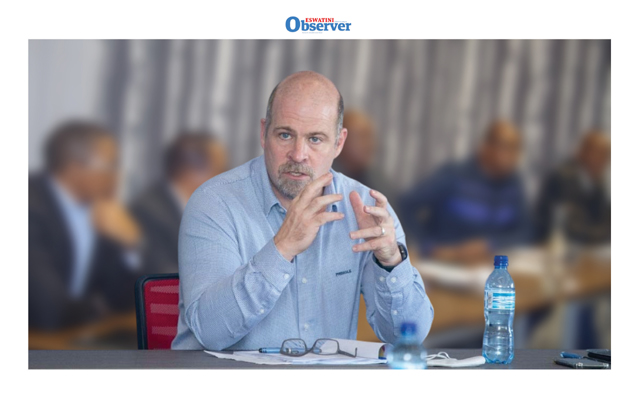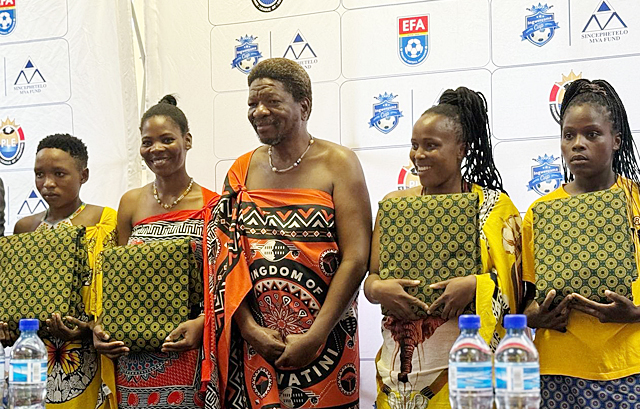By SIBONGILE SUKATI | 2022-06-27
“Let us serve the LGBTQI community as much as we serve the other community members in our countries,”.
This was the submission made by Lubombo Region MP Lorraine Nxumalo at the African Parliamentary Forum on Gender and Sexual Minorities meeting which was held in Johannesburg, South Africa and ended on Friday.
LGBTQI is an acronym for lesbian, gay, bisexual, transgender, queer and intersex.
The MP was addressing fellow parliamentarians from 12 other countries represented including Eswatini.
The MP said she was grateful for the opportunity to share some thoughts about the important issues under discussion.
She said in sharing her thoughts she would of course make reference to the Eswatini experience, but she believed that many of the issues raised were of principle and applicable to many countries.
Nxumalo said in view of their roles in being representatives of the people, passing legislation, providing oversight over government, and approving national budgetary allocations, members of parliament (MPs) had a key role to play in ensuring that discrimination against and marginalisation of any person or group was removed and inclusion was promoted.
“Eswatini society is very conservative and issues of sexual orientation and gender identity continue to face resistance,” she said.
She informed her colleagues that a few weeks ago, civil society organisations made presentations at the public hearings hosted by parliament on two bills related to marriage.
“While the LGBTI representative was able to make submissions, the general response was one of derision, not just from parliament, but also from the media and those that purport to be supportive of human rights and fundamental freedoms,” she said.
The MP said generally, culture and religion tended to be the basis of criticism against SOGI issues as detractors assert that to be gay, lesbian, transgender, was “unSwazi”, contrary to God and that the movement promoting SOGI rights is essentially a “foreign” concept being imposed from the West, reinforced by attachment of donor money.
“Nonetheless, having said that, it must be acknowledged that there has been progress, albeit at less than a snail’s pace,” she said.
Nxumalo submitted that clear changes could be identified when one looked at the fact that Eswatini was coming from a situation where there was complete denial about the existence of the LGBTI community, which contributed to LGBTI persons being “invisible” and therefore resulted in greater stigma and much less openness, let alone collective advocacy.
She said there were now several organisations openly working on SOGI issues, though they still face challenges.
She said although Pride month activities would be conducted for the sixth time this year – getting “permission” to undertake the first Pride activities was a hard won victory, but it clearly demonstrated the movement in acknowledging that there are issues affecting LGBTIs that required attention.
She said the passing of the Sexual Offences and Domestic Violence Act in 2018 removed “sodomy” as a crime - regardless of whether sexual intercourse by two men was consensual or not - and expanded the definition of rape by criminalising forceful sexual contact with any sex by any sex.
“LGBTI issues are not new, but the openness and intensification of advocacy is a relatively new area in Eswatini and we can build on and accelerate this progress,” she said.
Nxumalo said interestingly, it was the HIV and AIDS pandemic that brought SOGI issue into public discourse from government’s perspective and increased conversation, research, policy-making and programming on LGBTI issues in Eswatini, as they were categorised under “key populations” due to the vulnerabilities and risks to HIV infection that are faced by this community.
“The national policies on HIV as well as SRHR both make reference to not discriminating in provision of services, “she said.
Nxumalo said however, being confined to the health space has been frustrating for LGBTI rights advocates as they want to advocate for recognition of their equal rights in all spheres of life – socially, economically, and politically.
***
Selective acceptance experienced by LGBTI community
Some members of the LGBTI community say while they are “accepted” when talking about the health dimension, once they seek to expand engagement beyond this, even civil society organisations retreat from collaborating with them.
Lubombo Region MP Lorraine Nxumalo said; “this selective ‘acceptance’ that seeks to acknowledge certain rights and deny others is inherently contrary to the universality, indivisibility, inalienability and interconnectedness of human rights.”
She said it had not helped the situation that government has been inconsistent in how it treats SOGI issues.
Nxumalo said Eswatini’s Constitution guaranteed equality and prohibited discrimination.
“The country has also ratified various regional and international human rights instruments that guarantee human rights and fundamental freedoms.
In its State Party reports, government has asserted that discrimination against LGBTI is unlawful, citing the equality cause in national constitution that prohibits discrimination due to various issues, including gender, stating that this also includes issues of sexual orientation and gender identity,” it was submitted.
However, according to Nxumalo government had contradicted these assertions in practice – for example, an LGBTI organisation – Eswatini Sexual and Gender Minorities - had been denied registration as an NGO, with the Registrar of Companies (that registers NGOs) stating that the objectives of the organisation promote “unnatural” behaviour that is contrary to the values of Eswatini society.
“The organisation took this matter to court and while the court acknowledged that members of the LGBTI community have the same human rights as all other people, it stopped short of affirming the organisation’s right to register,” she said.
Nxumalo said this clearly showed that much remains to be done in ensuring that the LGBTI community is not left at the periphery of development because their voices are absent due to non-recognition by State structures and processes. She said in this context, parliamentarians could ensure the LGBTI community is not left behind as countries consult on, plan and the implement development agenda.
“I believe we can answer this question by going back to the role of MPs mentioned earlier, representation as MPs were not in their positions for themselves - they must represent all people therefore their engagement with constituencies cannot be determined by personal bias or prejudice, she said.
She said parliamentarians must be exemplary of the principle of non-discrimination and hence must necessarily be open to hear people’s concerns and aspirations so as to effectively raise and debate their issues in the legislature.
This, Nxumalo said essentially meant that members of LGBTI community and their organisations should not be side-lined when MPs conduct consultations and MPs should participate in meetings or activities when invited by these organisations so as to gain deeper insight into the issues they face
She said as legislators, MPs must ensure that all existing traces of discrimination against the LGBTI community are removed and that no discriminatory legislation passes in the House/ Assembly.
However, even though parliamentarians, influenced by their own socialisation, may have a “knee jerk” reaction in terms of resisting SOGI issues, the reality is that some of the positions taken were based out of ignorance and a lack of appreciating how these issues are linked to the wider development of society and the obligations government to implement policy frameworks such as the SDGs and African Union Agenda 2063 that Eswatini has committed to.
“Further, in many cases, such as Eswatini, there is insufficient institutional capacity to support MPs in their work – for instance, in addition to engagement, MPs should be able to also conduct their own research so as to have factual information when they debate; sadly, many do not have the facilities (including basic ones such as computer equipment and the internet) or parliamentary researchers to assist with relevant information,’; she said.
Nxumalo said understandably, a lot was expected from parliamentarians, but without the knowledge and capacity to discuss these issues beyond the superficial moralistic judgement, they will not be able to effectively play their roles.
“I would therefore recommend that investment be made by development partners as well as LGBTI organisations to build MPs’ capacity in this regard,” she said.
share story
Post Your Comments Below
The GNU in its current form is not likely to last, with pointed comments from the Preside...

BUSINESS Eswatini (BE) Vice President Andrew le Roux has stepped down from his position permanent...

IN a significant gesture, their Majesties blessed the participants of the Ingwenyama Cultural Cup...
FORMER NatCom Edgar Hillary says the request of Phase II salary restructuring exercise im...
All material © Swazi Observer. Material may not be published or reproduced in any form without prior written permission.
Design by Real Image Internet